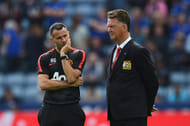It is some surprise that under Louis van Gaal Manchester United has made a worse start to the season than under David Moyes last year. It is surely the calibre of the Dutchman that has kept discontent at a minimum. With so much investment in the summer, United’s minimum goal is to finish in the Premier League top four, while the lack of League Cup and Champions League games might even allow the Reds a shot at the title.
Still, after just five games, United has drifted to eight points behind Chelsea and five off Arsenal. With 33 games remaining these points can be made up, but there is no denying that a win and two draws out of five games against relative minnows is a very poor start.
Club’s that suffer a bad run at the beginning of the season often attribute the malaise to a ‘squad gelling,’ while Sir Alex Ferguson often cited his side as an example of “late starters.” But what about teams that make a great start? Does this contribute to a strong season as a whole, with the side continuing to win. Or do teams’ great starts unravel as the season marches on and injuries take toll? Data Rant takes a look.
Figure 1, below, charts the total points gained in a season versus points gathered in the first five games – we look at the teams involved in past two Premier League campaigns. There is little to suggest that the final point tally can be predicted from early season form.
In 2012/13, Chelsea enjoyed the best start by gathering 13 points from five games yet ended up third. Liverpool had a comparatively bad start, ending up with two points in five games – the same as Reading and Q.P.R. Yet, the Anfield side finished seventh while Reading and Q.P.R were relegated. Newcastle United, on the other hand, enjoyed a relatively good beginning to the campaign, gaining eight points, but barely escaped relegation. Tottenham Hotspur, who managed the same eight points, almost beat Arsenal to Champions League qualification.
In the following season, 2013/14, Arsenal and Tottenham won two more points in first five games than Manchester City, Liverpool and Chelsea yet finished fourth and sixth. Sunderland only mustered one point, but survived relegation despite Norwich City, Fulham and Cardiff City winning four, four and five points at the start.
Any team can have an off day; a well prepared minnow can also take a bigger side by surprise and win on its merits. The goal for every team is to not only minimise losses and draws, but also to make sure that it bounces back from any surprise.
In this Data Rant a poor streak is defined as two or more consecutive draws or losses and its length as the number of these consecutive draws or losses. In figure 2, below, there is stunning correlation between total points and the aggregate of poor streaks. It is also totally predictable – the team that loses and draws the least will win the title.
Still, this result warrants some discussion – consider last season’s champions Manchester City. The club had two poor streaks during the campaign, each with a loss and a draw. Apart from those runs, City had four ‘isolated’ losses and three ‘isolated’ draws – more lost points in isolation than through poor form.
Liverpool, the runners-up, narrowly missed the title in 2013/14 with only one more draw than City, but the Merseysiders had two more poor streaks than the Etihad side. Arguably, resilience won the title for City.
In figure 3 we look directly at the relationship between points and the average length of poor streaks. At first, there is little to speak of, but a trend emerges, in Figure 4, when we remove the outliers such as Reading.
Notice that a seemingly clear outlier in Chelsea, 12/13, has not been removed. The London side shall serve as a litmus test, of sorts, to determine if either the length or number of poor streaks has a discernible effect on the final points tally. The trend is much stronger in the latter.
Chelsea managed to reduce the average length of a poor streak length by 56 per cent over the two seasons yet only gained a 9.3 per cent increase in total points. In short, a team may have a poor patch of form – even a pretty severe one - but it’s fine as long as the team can get back to winning ways and stay on that path.
In 2012/13 and 2013/14 the top four sides, at most, suffered five poor streaks (Arsenal 12/13). United has already totted up one such streak this season and is on the cusp of another. It is worth noting that Arsenal beat Tottenham to fourth in 2012/13 by one point, while Liverpool, 2nd, and United, 7th, both suffered four poor streaks. Given that, Van Gaal can afford only two more bad runs this season. A title run remains feasible - though there is little room for mistakes . Then again, title runs tend to be that way.
All data from SquawkaAssumptions dictating linear regression have not been held strict

